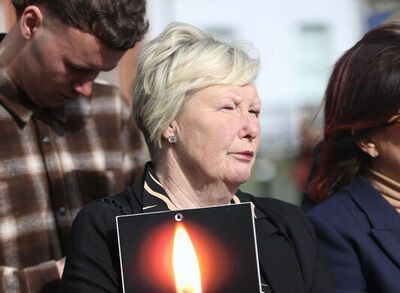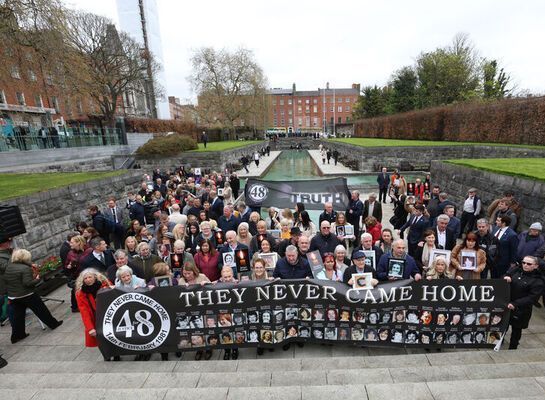From left to right, Brendan Bell, flute [facing away]; Nathan Gourley, fiddle; Sean McComiskey, accordion; Daniel Neely, banjo; Cillian Vallely, uilleann pipes; Sean Gavin, uilleann pipes; Josh Dukes, guitar performing a few years ago at the Saturday afternoon session at Lillie’s, 13 East 17th St., between Union Square Park and 5th Avenue, in Manhattan. PHOTO BY JIMMY O'KELLY
By Daniel Neely
This past week I was struck by the news that one of New York's nicest sessions, the Sunday evening affair uilleann piper Kevin McHugh hosted at the Cuckoo's Nest in Woodside, Queens, was coming to an end. (The final session will take place on Sunday, Sept. 17, 6-9 p.m.) For over a decade, the Cuckoo's was a great home for music and I'm sorry to see it go. McHugh and guitarist Matt Stapleton (who has been a fixture for the last several years) did an excellent job of making it a most welcoming spot, but the economy, such as it is, dictated the bar move in a new direction. Although regrettable for the music community, it was surely a sound business decision and the parting, I understand, has been nothing but amicable.
Pub sessions like the Cuckoo's are a relatively recent phenomenon. Largely the product of immigration, they originally provided a taste of home and were something of a necessity for musicians who had left Ireland only to land in places with far greater population density. Unable to play all night in a crowded London flat meant that a fiddle player might have to go to the Favourite if s/he wanted to get a tune. In New York, the same musician might have to head over to the Bunratty, or the Village Coach House if s/he was living in Boston. Each of these places was an important home for music at one time or another and the template on which today's sessions are largely based.
Unfortunately, "Irish" pubs are no longer as widespread as they once were. There are tons of reasons for this. For instance, the Internet and regular, relatively cheap transatlantic flights mean that Ireland is never really that far away. This convenience has perhaps changed the community role the pub once had. In addition, increasingly restrictive U.S. immigration policy has diminished demand. Add to this skyrocketing commercial rents around the country and it's easy to understand the pub's slow withdrawal from the urban landscape.
Does all of this mean the Irish pub is a thing of the past and traditional music casualty of change? Certainly not. In recent years many establishments have emerged to meet modern commercial demands by scaling up, taking advantage of trends in craft beers and whiskeys, and adopting a more sophisticated approach to menu building. These places still provide the Irish community with a sense of the familiar, but they've also cultivated ways of attracting a broader and perhaps less exclusively Irish clientele. This can only serve a pub owner's financial interests, but the music's interests as well. The best of these spots recognize the importance music can have in creating a sense of atmosphere and community and feature a weekly trad music session.
It's important to note that today's musical standard is as high as it's ever been. There are many top level U.S.-based musicians who play in pub sessions, and since "Ireland is never really that far away" they're as connected to the international community as perhaps they've ever been. Folks travel to Ireland more regularly, participate in organizations like Comhaltas, go to festivals like the Catskills Irish Arts Week, and even participate in the music's intellectual life on social networking sites like Facebook. Things like this help ensure the music's steady course by giving it good direction and can all be considered elements of today's "living tradition."
But the close of a session like the one at the Cuckoo's Nest is a reminder of each one's ephemerality. A seemingly successful tune spot that attracts tons of musicians can come to an end without warning. So what defines success, here? Unfortunately, there's no quantifiable calculus, but a good location, an inviting, intimate space, musicians who treat the session as a benevolent meritocracy, sympathetic bartenders, and a committed ownership all seem to be bedrock traits. When these things begin to click, a session can quickly develop an international profile. But none of it means very much without the paying, locally based customers who come in to eat, drink, listen and enjoy the atmosphere traditional Irish music offers.
This is to say that it's important for non-musicians to support session-friendly pubs. Maybe it's the occasional afternoon or night out with friends on weekends, or a family meal, or just a quick in-and-out jar where tunes are happening, but it's the occasional visit that makes a world of difference. It's even better when someone at the bar hears it was the music that attracted the business.
Let me close this column, then, with an invitation to readers to get out to their local session spots this fall to hear a bit of music. It's an easy and enjoyable thing to do and there are many spots around that embrace the values and spirit of the old fashioned Irish pub while at the same time providing a modern eating and drinking experience. If you're new to this and are unsure about where your nearest session is, the Ceol Agus Rince calendar will give you a handy start. For more about the Saturday afternoon session at Lillie's mentioned in the caption, read about it here.










